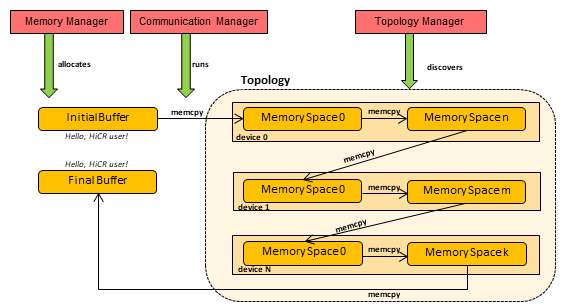Memcpy: Local
In this example, we test HiCR’s memcpy operation to run a Telephone Game test, where a contiguous memory array is copied along all the memory spaces found in the local HiCR instance, as detected by a HiCR::TopologyManager, and then back to the initial space (see Fig. 1). The example then tests the initial and resulting array contain the same bytes.

Fig. 1 Telephone Game Example
The code is structured as follows:
include/telephoneGame.hppcontains the application’s backend-independent semanticssource/contains variants of the main program implemented under different backendspthreads.cppcorresponds to the Pthreads + HWLoc backend implementation. This variant moves the initial allocation across all of the system’s RAM NUMA domains.acl.cppcorresponds to the ACL + HWLoc backend implementation. This variant moves the initial allocation across all Huawei GPU devices found.opencl.cppcorresponds to the OpenCL + HWLoc backend implementation. This variant moves the initial allocation across all devices found by the OpenCL platform.
Both the producer and consumer functions receive a set of HiCR::MemorySpace, each of which will take a turn in the telephone game. They also receive an instance of the HiCR::MemoryManager, for the allocation of local memory slots across all memory spaces provided, and; an instance of HiCR::CommunicationManager, to communicate the data the HICR memory spaces.
For each step of the telephone game, the following steps will happen.
Topology detection
First, we detect the available topology using one topology manager or more than one to detect also heterogeneous devices.
// Instantiating hwloc topology manager
// Pthreads example will only use this
HiCR::backend::hwloc::TopologyManager ht(&topology);
// Use to detect Huawei devices
HiCR::backend::acl::TopologyManager at();
// Query topologies
ht.queryTopology();
at.queryTopology();
Source local memory slot allocation and initialization
We create the first local memory slot on the host RAM and initialize it with a message.
// Instantiating hwloc memory manager
// Pthreads example will only use this
HiCR::backend::hwloc::MemoryManager m(&topology);
auto input = m.allocateLocalMemorySlot(firstMemSpace, BUFFER_SIZE); // First NUMA Domain
// Initializing values in memory slot 1
sprintf((char *)input->getPointer(), "Hello, HiCR user!\n");
Local memory slot allocations
We allocate N local memory slot on each memory space detected by the topology managers.
// memspaces is a collection of all the available namespaces detected
auto memspaces = ...
// Collect the newly created memory slots
auto memSlots = std::vector<std::shared_ptr<HiCR::LocalMemorySlot>>{};
// iterate all over the memory spaces and create N memory slots in each one
for (const auto &memSpace : memSpaces)
for (int i = 0; i < N; i++) memSlots.emplace_back(m.allocateLocalMemorySlot(memSpace, BUFFER_SIZE));
Local memory slot memcpy
We now iterate through all the memory slots, copying the message around. The fist is the input previously created, and the last memory slot is again on the host RAM.
// For each of the detected memory slots...
for (auto dstMemSlot : memSlots)
{
// Initialize the memory slot; smoke test for memset
m.memset(dstMemSlot, 0, BUFFER_SIZE);
// Perform the memcpy operations
c.memcpy(dstMemSlot, DST_OFFSET, srcMemSlot, SRC_OFFSET, BUFFER_SIZE);
// fence when the memcpy happens between two different memory spaces
c.fence(0);
// update source memory slot
srcMemSlot = dstMemSlot;
}
// Getting output memory slot (the last one in the list)
auto output = *memSlots.rbegin();
// print the output of the telephone game
printf("Input: %s\n", (const char *)input->getPointer());
printf("Output: %s\n", (const char *)output->getPointer());
Note
In order for the memcpy operation to be succesfull between local memory slots allocated by different backends
The expected result of running this example is:
Input: Hello, HiCR user!
Output: Hello, HiCR user!